

|
|
||
Transum.orgThis web site contains over a thousand free mathematical activities for teachers and pupils. Click here to go to the main page which links to all of the resources available. Please contact me if you have any suggestions or questions.
|
More Activities: |
|
|
Mathematicians are not the people who find Maths easy; they are the people who enjoy how mystifying, puzzling and hard it is. Are you a mathematician? Comment recorded on the 14 October 'Starter of the Day' page by Inger Kisby, Herts and Essex High School: "Just a quick note to say that we use a lot of your starters. It is lovely to have so many different ideas to start a lesson with. Thank you very much and keep up the good work." Comment recorded on the 28 May 'Starter of the Day' page by L Smith, Colwyn Bay: "An absolutely brilliant resource. Only recently been discovered but is used daily with all my classes. It is particularly useful when things can be saved for further use. Thank you!" |
Each month a newsletter is published containing details of the new additions to the Transum website and a new puzzle of the month. The newsletter is then duplicated as a podcast which is available on the major delivery networks. You can listen to the podcast while you are commuting, exercising or relaxing. Transum breaking news is available on Twitter @Transum and if that's not enough there is also a Transum Facebook page. |
|
Numeracy"Numeracy is a proficiency which is developed mainly in Mathematics but also in other subjects. It is more than an ability to do basic arithmetic. It involves developing confidence and competence with numbers and measures. It requires understanding of the number system, a repertoire of mathematical techniques, and an inclination and ability to solve quantitative or spatial problems in a range of contexts. Numeracy also demands understanding of the ways in which data are gathered by counting and measuring, and presented in graphs, diagrams, charts and tables." Secondary National Strategy, Mathematics at key stage 3 |
||
Go MathsLearning and understanding Mathematics, at every level, requires learner engagement. Mathematics is not a spectator sport. Sometimes traditional teaching fails to actively involve students. One way to address the problem is through the use of interactive activities and this web site provides many of those. The Go Maths main page links to more activities designed for students in upper Secondary/High school. | ||
Teachers | ||
|
If you found this activity useful don't forget to record it in your scheme of work or learning management system. The short URL, ready to be copied and pasted, is as follows: |
Alternatively, if you use Google Classroom, all you have to do is click on the green icon below in order to add this activity to one of your classes. |
It may be worth remembering that if Transum.org should go offline for whatever reason, there are mirror site at Transum.info that contains most of the resources that are available here on Transum.org. When planning to use technology in your lesson always have a plan B! |
|
Do you have any comments? It is always useful to receive feedback and helps make this free resource even more useful for those learning Mathematics anywhere in the world. Click here to enter your comments. |
||
© Transum Mathematics :: This activity can be found online at:
www.Transum.org/go/?Num=1001
Close
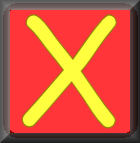
Level 1 - Calculations containing 5 numbers and symbols
Examples: 1+2=3 or 6=8−2
Level 2 - Calculations containing 6 numbers and symbols
Examples: 3×4=12 or 5=14-9
Level 3 - Calculations containing 7 numbers and symbols
Examples: 2×2×2=8 or 5−3=2÷1
Level 4 - Calculations containing 8 numbers and symbols
Examples: 9×6=58−4 or 4+5+9=18
Level 5 - Calculations containing 9 numbers and symbols
Examples: 9^2=24+57 or √16=67−63
Vocabero - A similar game requiring you to guess a mathematical word.
Mathstermind - The Transum version of that old game requiring you to guess a number.
More Puzzles - all with a mathematical theme.
Suppose I am thinking of the calculation 1+2=3
You have to try and gress what my calculation is.
For your first guess you may type in 4-1=3
When you have finished typing the tiles will change colour. The colours are the clues:
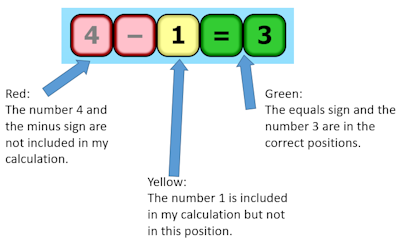
Now have another guess at my calculation. Use the clues that you have been given.
Each of your guesses (for Levels 1 to 4) should be a correct mathematical equation (two equivalent expressions with an equals sign between them).
You will earn points for guessing my calculation correctly. When you have earned enough points you can claim a trophy.
Here is an example from level 4:
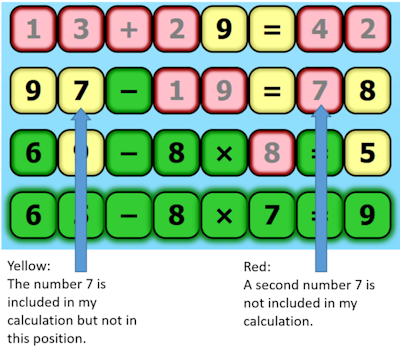
I hope you enjoy working on these puzzles and I wish you many green tiles!
Answers to this exercise are available lower down this page when you are logged in to your Transum account. If you don’t yet have a Transum subscription one can be very quickly set up if you are a teacher, tutor or parent.
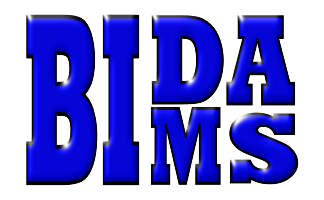
BIDMAS is an acronym reminding pupils of the order of operation used when evaluating expressions involving a number of different operations. The letters of BIDMAS stand for:
When only addition and subtraction (or only multiplication and division) are left in an expression you should work them out in the order you find them, starting from the left and working towards the right. The blue image of the letters above has been designed to show that multiplication and division have the same importance as the letter M is in the same position as the letter D. The same can be said for the letters A and S.
For example, to evaluate the expression 32 + 5 x 7 - (4 - 3)
Work out the brackets first which gives 32 + 5 x 7 - 1
Then the indices 9 + 5 x 7 - 1
Then the multiplication 9 + 35 - 1
Then the addition and subtraction in the order they are given
The answer is 43
PEMDAS is an alternative acronym.
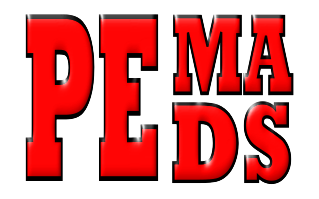
Close

Transum,
Saturday, January 8, 2022
"It is not sufficient just to find an expression that’s true but to find the exact expression that I was thinking of. For example 6-1=5 while true would not be correct if I am thinking of 6=1+5."
Fiona Rosler, Twitter
Monday, February 7, 2022
Transum,
Thursday, July 14, 2022
"Mathematical Pie has been around for as long as I can remember. It is published three times a year and is aimed at pupils from 10 to 14 years of age, but is read by all age groups. Each issue contains a variety of problems and challenges, stimulating mathematical activity. The questions vary in their difficulty so that there are suitable starting points for all ages of student. It is published by the Mathematical Association.
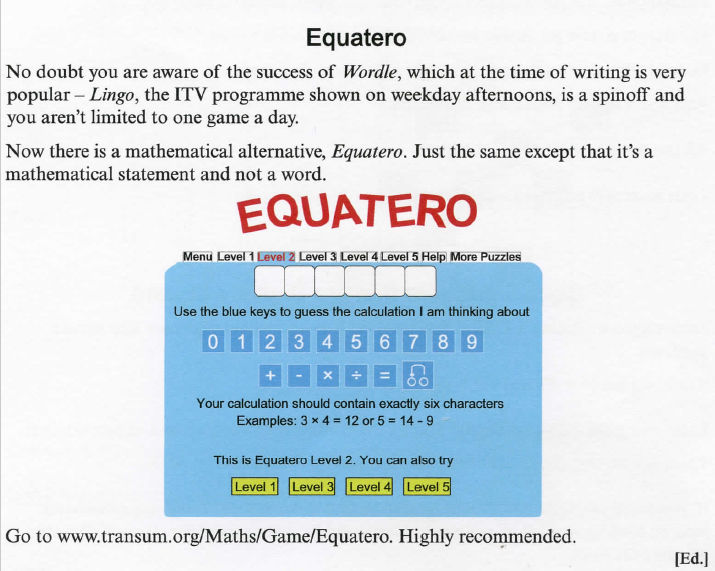 "
"
I was excited to find out that the Summer 2022 edition featured Equatero. What an honour!. Here is the excerpt: